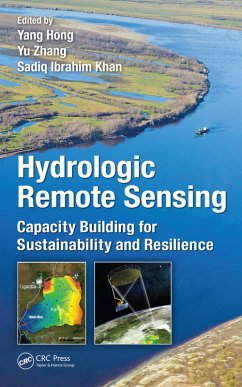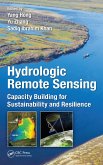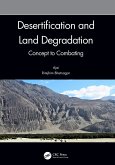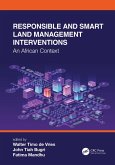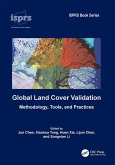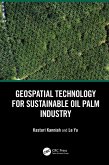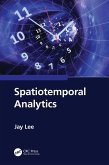Hydrologic Remote Sensing (eBook, ePUB)
Capacity Building for Sustainability and Resilience
Redaktion: Hong, Yang; Khan, Sadiq; Zhang, Yu


Alle Infos zum eBook verschenken

Hydrologic Remote Sensing (eBook, ePUB)
Capacity Building for Sustainability and Resilience
Redaktion: Hong, Yang; Khan, Sadiq; Zhang, Yu
- Format: ePub
- Merkliste
- Auf die Merkliste
- Bewerten Bewerten
- Teilen
- Produkt teilen
- Produkterinnerung
- Produkterinnerung

Hier können Sie sich einloggen

Bitte loggen Sie sich zunächst in Ihr Kundenkonto ein oder registrieren Sie sich bei bücher.de, um das eBook-Abo tolino select nutzen zu können.
Environmental remote sensing plays a critical role in observing key hydrological components such as precipitation, soil moisture, evapotranspiration and total water storage on a global scale. As water security is one of the most critical issues in the world, satellite remote sensing techniques are of particular importance for emerging regions which have inadequate in-situ gauge observations. This book reviews multiple remote sensing observations, the application of remote sensing in hydrological modeling, data assimilation and hydrological capacity building in emerging regions.
- Geräte: eReader
- mit Kopierschutz
- eBook Hilfe
- Größe: 206.81MB
![Hydrologic Remote Sensing (eBook, PDF) Hydrologic Remote Sensing (eBook, PDF)]() Hydrologic Remote Sensing (eBook, PDF)146,95 €
Hydrologic Remote Sensing (eBook, PDF)146,95 €![Desertification and Land Degradation (eBook, ePUB) Desertification and Land Degradation (eBook, ePUB)]() AjaiDesertification and Land Degradation (eBook, ePUB)59,95 €
AjaiDesertification and Land Degradation (eBook, ePUB)59,95 €![Responsible and Smart Land Management Interventions (eBook, ePUB) Responsible and Smart Land Management Interventions (eBook, ePUB)]() Responsible and Smart Land Management Interventions (eBook, ePUB)48,95 €
Responsible and Smart Land Management Interventions (eBook, ePUB)48,95 €![Global Land Cover Validation (eBook, ePUB) Global Land Cover Validation (eBook, ePUB)]() Global Land Cover Validation (eBook, ePUB)131,95 €
Global Land Cover Validation (eBook, ePUB)131,95 €![Geospatial Technology for Sustainable Oil Palm Industry (eBook, ePUB) Geospatial Technology for Sustainable Oil Palm Industry (eBook, ePUB)]() Kasturi KanniahGeospatial Technology for Sustainable Oil Palm Industry (eBook, ePUB)121,95 €
Kasturi KanniahGeospatial Technology for Sustainable Oil Palm Industry (eBook, ePUB)121,95 €![Spatiotemporal Analytics (eBook, ePUB) Spatiotemporal Analytics (eBook, ePUB)]() Jay LeeSpatiotemporal Analytics (eBook, ePUB)50,95 €
Jay LeeSpatiotemporal Analytics (eBook, ePUB)50,95 €![GIS (eBook, ePUB) GIS (eBook, ePUB)]() Patrick McHaffieGIS (eBook, ePUB)101,95 €
Patrick McHaffieGIS (eBook, ePUB)101,95 €-
-
-
Dieser Download kann aus rechtlichen Gründen nur mit Rechnungsadresse in A, B, BG, CY, CZ, D, DK, EW, E, FIN, F, GR, HR, H, IRL, I, LT, L, LR, M, NL, PL, P, R, S, SLO, SK ausgeliefert werden.
Hinweis: Dieser Artikel kann nur an eine deutsche Lieferadresse ausgeliefert werden.
- Produktdetails
- Verlag: Taylor & Francis eBooks
- Seitenzahl: 413
- Erscheinungstermin: 26. Oktober 2016
- Englisch
- ISBN-13: 9781315353326
- Artikelnr.: 47139343
- Verlag: Taylor & Francis eBooks
- Seitenzahl: 413
- Erscheinungstermin: 26. Oktober 2016
- Englisch
- ISBN-13: 9781315353326
- Artikelnr.: 47139343
- Herstellerkennzeichnung Die Herstellerinformationen sind derzeit nicht verfügbar.
Precipitation Monitoring. Diurnal Variability of Precipitation in West
Africa Monsoon Region. ET Mapping Utilizing Remote Sensing Data. Soil
Moisture Estimation Using Active and Passive Remote Sensing Techniques.
Remote Sensing Streamflow Estimation via AMSR-E and TMI. Remote Sensing for
Surface and Ground Water Observation. Total Water Storage Observed by
GRACE. Modeling and Data Assimilation. The Coupled Routing and Excess
Storage (CREST) Distributed Hydrological Mode. AMMAS Land Surface Model
Intercomparison over West Africa. Multi-Sensor Imaging and Space-Ground
Cross-Validation for 2010 Flood along Indus River, Pakistan.
Hydroclimatology of Lake Victoria Region Using Hydrologic Model and
Satellite Remote Sensing Data. Microwave Satellite Data for Hydrologic
Modeling in an Ungauged Basin in Africa. Assimilating the Passive Microwave
Streamflow Signals for Improving the Hydrological Predictions in Okavango
River Basin, Africa. Statistical and Hydrologic Evaluation of Satellite
Precipitation Products for Mountainous Basin. Capacity Building. Real Time
Operation Hydrological Monitoring and Forecasting System for Local Decision
Makers. Satellite Remote Sensing Drought Monitoring and Predictions Over
the Globe. Capacity Building Efforts in Hydrological Modeling for Africa -
Workshops about CREST Mode. Capacity Building for Pakistan
Hydrometeorologic Hazards. Cloud-Based Cyber-Infrastructure for Disaster
Monitoring sand Mitigation Mobile Device Apps for Empowering Citizen
Scientists.
Precipitation Monitoring. Diurnal Variability of Precipitation in West
Africa Monsoon Region. ET Mapping Utilizing Remote Sensing Data. Soil
Moisture Estimation Using Active and Passive Remote Sensing Techniques.
Remote Sensing Streamflow Estimation via AMSR-E and TMI. Remote Sensing for
Surface and Ground Water Observation. Total Water Storage Observed by
GRACE. Modeling and Data Assimilation. The Coupled Routing and Excess
Storage (CREST) Distributed Hydrological Mode. AMMAS Land Surface Model
Intercomparison over West Africa. Multi-Sensor Imaging and Space-Ground
Cross-Validation for 2010 Flood along Indus River, Pakistan.
Hydroclimatology of Lake Victoria Region Using Hydrologic Model and
Satellite Remote Sensing Data. Microwave Satellite Data for Hydrologic
Modeling in an Ungauged Basin in Africa. Assimilating the Passive Microwave
Streamflow Signals for Improving the Hydrological Predictions in Okavango
River Basin, Africa. Statistical and Hydrologic Evaluation of Satellite
Precipitation Products for Mountainous Basin. Capacity Building. Real Time
Operation Hydrological Monitoring and Forecasting System for Local Decision
Makers. Satellite Remote Sensing Drought Monitoring and Predictions Over
the Globe. Capacity Building Efforts in Hydrological Modeling for Africa -
Workshops about CREST Mode. Capacity Building for Pakistan
Hydrometeorologic Hazards. Cloud-Based Cyber-Infrastructure for Disaster
Monitoring sand Mitigation Mobile Device Apps for Empowering Citizen
Scientists.
